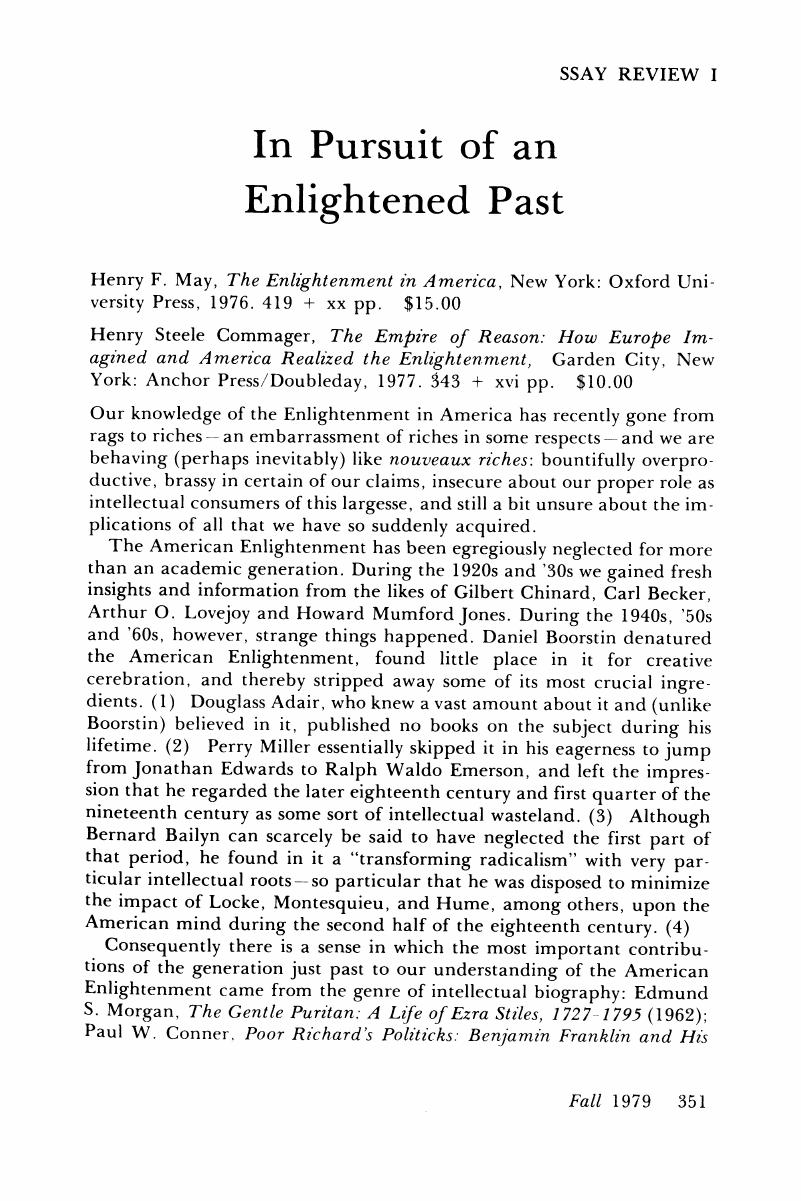No CrossRef data available.
Article contents
In Pursuit of an Enlightened Past
Published online by Cambridge University Press: 24 February 2017
Abstract

- Type
- Essay Reviews
- Information
- Copyright
- Copyright © 1979 by History of Education Society
References
Notes
1 See Boorstin, Daniel, The Genius of American Politics (Chicago, 1953), chs. 1 and 3; The Americans: The Colonial Experience (New York, 1958), esp. pp. 147 68, 241 65, 293 316; and “The Myth of an American Enlightenment,” in Boorstin, America and the Image of Europe (New York, 1960), pp. 65 78.Google Scholar
2 Following his tragic death in 1968, a devoted cluster of friends collaborated to publish an intriguing volume of Adair's papers: Fame and the Founding Fathers , edited by Colbourn, Trevor, with a personal memoir by Robbins, Caroline and a bibliographical essay by Shalhope, Robert E. (New York, 1974). See my essay-review of that volume in Reviews in American History, 3 (June 1975), pp. 196 205.Google Scholar
3 For three very different sorts of bridges which Miller attempted to construct across the chasm between ca. 1740 and ca. 1840, see “From Edwards to Emerson,” in Miller, Perry, Errand Into the Wilderness (Cambridge, Mass., 1956), pp. 184–203; “From the Covenant to the Revival,” in The Shaping of American Religion , edited by Smith, James Ward and Leland Jamison, A., vol. 1 of Religion in American Life (Princeton, 1961), pp. 322 68; and Miller, Perry, ed., The Legal Mind in American, from Independence to the Civil War (Garden City, N.Y., 1962). For the perpetuation of this same urge to leap from Edwards to Emerson, see Bercovitch, Sacvan, The Puritan Origins of the American Self (New Haven, 1975), ch. 5.Google Scholar
4 See Bailyn, Bernard, ed., Pamphlets of the American Revolution, 1750–1776 (Cambridge, Mass., 1965), 1. General Introduction: The Transforming Radicalism of the American Revolution; Bailyn, Bernard, The Origins of American Politics (New York, 1968); and “Political Experience and Enlightenment Ideas in Eighteenth-Century America,” American Historical Review, 67 (Jan. 1962): 339 51.Google Scholar
5 See Appleby, Joyce, “The Social Origins of American Revolutionary Ideology,” The Journal of American History, 64 (March 1978): 935–58; “Ideology and Theory: The Tension Between Political and Economic Liberalism in Seventeenth-Century England,” American Historical Review, 81 (June 1976): 499–515; “Locke. Liberalism and the Natural Law of Money,” Past and Present, #71 (May 1976): 43 69; “Liberalism and the American Revolution,” The New England Quarterly, 49 (March 1976): 3 26; and “America as a Model for the Radical French Reformers of 1789,” The William and Mary Quarterly, 28 (April 1971): 267–86.Google Scholar
6 Quoted by May, , Enlightenment in America, p. 111.Google Scholar
7 See Koch, Adrienne, ed., The American Enlightenment: The Shaping of the American Experiment and a Free Society (New York, 1965); Madison's “Advice to My County” (Princeton, 1966); Adams and Jefferson: “Posterity Must Judge” (Chicago, 1963); Power, Morals, and the Founding Fathers: Essays in the Interpretation of the American Enlightenment (Ithaca, 1961); Jefferson and Madison: The Great Collaboration (New York, 1950); and The Philosophy of Thomas Jefferson (New York, 1943).Google Scholar
8 In this 1787 work Adams wrote that the American colonists “were universally too enlightened to be imposed on by artifice; and their leaders, or more properly followers, were men of too much honor to attempt it.” A Defence of the Constitutions of Government of the United States of America (1787), 3 vols., in The Works of John Adams …, edited by Adams, Charles Francis (Boston, 1851), IV, p. 293.Google Scholar
9 May regards the correspondence between “the two sages” as “the greatest document of the American Enlightenment” (p. 336). Cf. the fascinating comment made by Ezra Pound in 1937: “nothing surpasses the evidence that CIVILIZATION WAS in America, than the series of letters exchanged between Jefferson, and Adams, John. during the decade of reconciliation after their disagreements.” “The Jefferson-Adams Letters as a Shrine and a Monument,” in Pound, , Impact: Essays on Ignorance and the Decline of American Civilization , edited by Stock, Noel (Chicago. 1960), p. 167.Google Scholar
10 See Gay's, Peter remark in The Enlightenment: An Interpretation , vol. II, The Science of Freedom (New York, 1969), p. 558: “The American Revolution converted America from an importer of ideas into an exporter. What it exported was. of course, mainly itself, but that was a formidable commodity — the program of enlightenment in practice.” Google Scholar
11 The phrase “empire of reason” appears in the writings of both Barlow, Joel and Freneau, Philip. Each instance is quoted in Henry May's book (pp. 191 and 237) even though they do not have the special resonance for him that they do for Commager.Google Scholar
12 For a progenitor of this view, see Bosher, John F., “Alfred Cobban's View of the Enlightenment,” in Studies in Eighteenth-Century Culture. I: The Modernity of the Eighteenth Century, edited by Milic, Louis T. (Cleveland, 1971), pp. 37–59, esp. p. 41.Google Scholar
13 For an interesting and pertinent elaboration, see Mead, Sidney, The Old Religion in the Brave New World: Reflections on the Relation between Christendom and the Republic (Berkeley, Calif., 1977). For a superb example of the dual emphasis upon faith and reason, see Backus, Charles, A Sermon Preached in Long-Meadow at the Public Fast, April 17, 1788 (Springfield, Mass., 1788).Google Scholar


